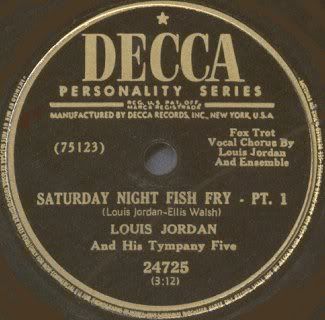 I had to go upstate yesterday and I forgot to bring along my favorite CD and track of the moment, Joey Defrancesco's version of Anthony Newley's, "Once In a Lifetime." It has an incredible arrangement with Joey backed by a great European Jazz Band. So I reach into my CD stash and come up with my Calloway CD and bingo. Talk about slanguage and Harlem history-Calloway was the man. I have a pdf file of many of his songs' that I can print out (at home-there's an ink crisis at school) for Mo's kids. I'll burn them CD's as well. In September I had a youtube of Calloway's Jumping Jive with the Nicholas brother. I'm too lazy to relink it, just do a search for Calloway. The other guy I should have thought of for the poetry, rap, slanguage connection was Louis Jordan. From wikipedia on Louis:
I had to go upstate yesterday and I forgot to bring along my favorite CD and track of the moment, Joey Defrancesco's version of Anthony Newley's, "Once In a Lifetime." It has an incredible arrangement with Joey backed by a great European Jazz Band. So I reach into my CD stash and come up with my Calloway CD and bingo. Talk about slanguage and Harlem history-Calloway was the man. I have a pdf file of many of his songs' that I can print out (at home-there's an ink crisis at school) for Mo's kids. I'll burn them CD's as well. In September I had a youtube of Calloway's Jumping Jive with the Nicholas brother. I'm too lazy to relink it, just do a search for Calloway. The other guy I should have thought of for the poetry, rap, slanguage connection was Louis Jordan. From wikipedia on Louis:"Jordan's raucous recordings were also notable for their use of fantastical narrative. This is perhaps best exemplified on the freewheeling party adventure "Saturday Night Fish Fry", the two-part 1950 hit that was split across both sides of a 78. It is arguably one of the earliest American recordings to include all the basic elements of the classic rock'n'roll genre (obviously exerting a direct influence on the subsequent work of Bill Haley) and it is certainly one of the first songs in popular music to use the word "rocking" in the chorus and to prominently feature a distorted electric guitar. [2]
Its distinctive comical adventure narrative is strikingly similar to the style later used by Bob Dylan in his classic "story" songs like "Bob Dylan's 115th Dream" and "Tombstone Blues". "Saturday Night Fish Fry" is also notable for the fact that it dispenses with the customary instrumental chorus introduction, but its most prominent feature is Jordan's rapid-fire, semi-spoken vocal. His delivery, clearly influenced by his experience as a saxophone soloist, de-emphasises the vocal melody in favour of highly syncopated phrasing and the percussive effects of alliteration and assonance, and it is arguably one of the earliest examples in American popular music of the vocal stylings that eventually evolved into rap."
LITTLE MOE:
If you ever been down to New Orleans
then you can understand just what I mean,
all through the week it's as quiet as a mouse
but on a saturday night they go from house to house
you don't have to pay the usual admission
if you're a cook, a waiter or a good musician
so if you happen to to be just passin' by
stop in at the saturday night fish fry.
ALL:
it was rockin'
LITTLE MOE:
Sing it fellas
ALL:
it was rockin'
LITTLE MOE:
See they know what I'm talkin' about
ALL:
You never seen such scufflin' and a shufflin'
'til the break of dawn.






No comments:
Post a Comment